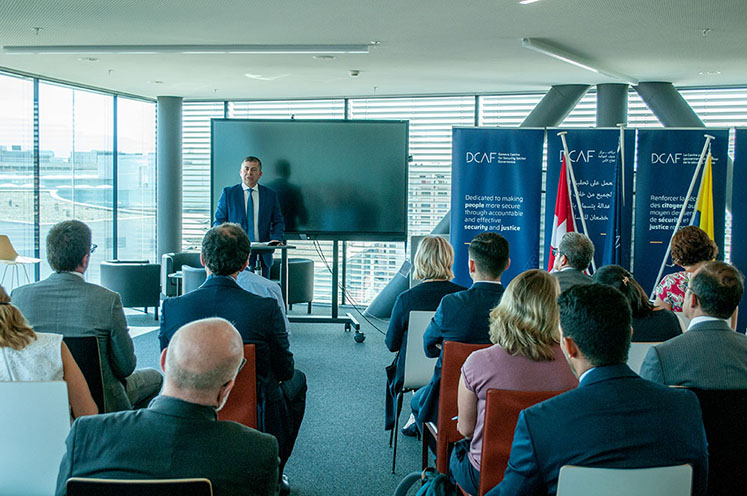Lessons from the Colombian experience in police transformation
Recently, members of the Geneva-based diplomatic community from Mexico, Brazil, and Uruguay, along with representatives of NGOs, think tanks, and international organisations gathered in DCAF’s headquarters at the Maison de la Paix to get insights from the Colombian National Police transformation process for peacebuilding.
The Colombian Police started the process in 2021 to strengthen public confidence and the legitimacy of the police service with citizens across the country.
The process encompasses short, medium, and long-term efforts focused on the evaluation of the previous reforms, checking the quality of the services, including the use of force, the quality of the leadership, the modernization and technological capacities, and the education standards. All with a democratic, transparent and human rights focus aimed at promoting accountability and citizen participation to improve the good governance of police services.

General Luis Ernesto Garcia Hernandez, Head of the Police Planning Department, sharing
lessons learnt during the process he has lead to modernize the National Police and
reconfigure Colombia’s citizen security framework. Photo: DCAF
The transformation process involved the implementation of a gender policy. It was made possible thanks to a gender self-assessment carried out with the participation of about 70% of the police force across the country.
As a result of this evaluation, significant changes were made, such as modifications in the use of language around gender, a new career plan, and altering the organizational structure of the police so that women and LGTBQ officers can be more involved in strategic decisions. In addition, there was a strengthening of the indicators of gender-based violence both inside, and outside, the police force.
HOW CAN IT CONTRIBUTE TO BUILDING PEACE AND HUMAN SECURITY?
TOP 5 LESSONS LEARNED
- Civil society involvement creates a foundation for sustainability, as well as an active listening to citizens across the country. It helps build a shared vision.
- Political support and senior leadership and commitment is mandatory, as well as an external independent advisory board with technical expertise and a critical approach.
- The transformation model should be designed to address organisational and cultural changes, and focus on values. Setting short, medium, and long-term objectives creates early victories while working on larger structural changes.
- Internal teams must drive the change. Build high-performance teams dedicated to the design and implementation of the reform process and directly linked to the director's office, as well as driving-force teams across the organisation.
- Comprehensiveness: workstreams should include the use of force, integrity, discipline, human talent management, and policing standards.
Despite good first results, several challenges remain in Colombia, such as the sustainability of the transformation process itself; the shared vision of police and civil society to understand and complete the process; the reform of the accountability and prevention system; and to generate technical and social competencies, with a particular focus on the community police model.
DCAF will continue supporting the National Colombian Police in its efforts to modernization and peacebuilding transformation process.
For more details on all the lessons learned from this process feel free to contact Cristina Hoyos, Head of our Latin America and Caribbean Unit at c.hoyos@dcaf.ch.
-------------------
Learn more about DCAF’s work in Colombia:
- Gender Self-Assessments of the National Police in Latin America and the Caribbean
- Colombia: Contributing to an inclusive peace process
- Publication: Bridging the Distance – Lessons Learnt from a Bottom-up Approach to Gender and Security in Colombia
- Publication: Mentoring in the Police Environment
- Publication: Use of police force: A framework to ensure good governance over the use of force
- YouTube Playlist: Colombian transformation process
 Share on Facebook
Share on Facebook Share on Linkedin
Share on Linkedin Share on Twitter
Share on Twitter